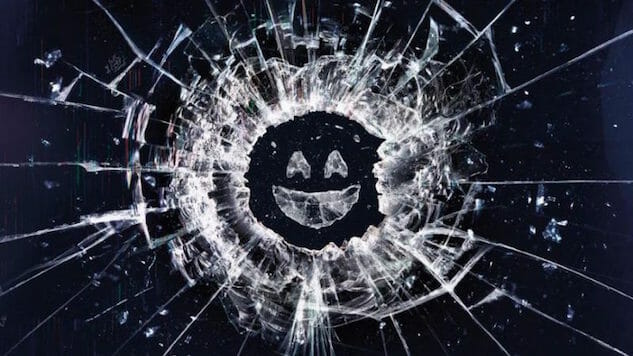Falling Out of Love with Black Mirror
In trying to be what Black Mirror is “supposed” to be, it’s only gotten further away from itself.

Despite writing about TV for a living—or really, perhaps because of it—I still get excited over new television. Yes, there is a lot of it and that can become numbing, but sometimes there’s nothing better than that feeling of a new season of a show you love or the premiere of a series you’ve been anticipating for a while (or maybe were surprised to learn exists). Which is why upon seeing the trailer for this newest season of Black Mirror, I found myself questioning why, instead of feeling excitement, the only two things I had in my mind about it were: 1). “Oh, Nicole Beharie’s in this?” and 2). Relief. That second thing, the relief that replaced previous season’s (even “Bandersnatch”) excitement, was relief that this season of Black Mirror would return to its roots and only give us the bliss of three episodes instead of a season of six or so of hourlongs (or, needlessly, even longer).
And then soon after that trailer, I was reminded of the excitement I had back in July 2016, when I first got screeners for two episodes of Season Three: “San Junipero” and “Shut Up and Dance.” While I certainly enjoyed the latter episode, the former remains my most cherished work-related screener viewing, as I could just tell I was watching something special as it happened. Then a few months later I received the rest of the season screeners, and I was honestly still in a that mood of enjoyment and excitement … a mood that unfortunately wasn’t quite there when it came to watching Season Four (once it dropped). That was the season where I got to the point of not needing or even wanting to watch in one sitting like I had done before as the episodes went on.
Watching Season Five, I started to wonder if I had just outgrown Black Mirror. For one, I spent more and more time thinking out loud how bad the episodes were. They were textbook examples of how it’s easy to distract from the bad when the episodes are so extremely polished. And when you’re a sci-fi anthology produced by Netflix, you have the resources to be extremely polished. Instead of even really caring what was going to happen next—one of the series’ biggest strengths—I found myself wondering how much time was left in the episodes (and usually, it would still be over an hour). Even what I considered the best episode of the bunch, the third episode—”Rachel, Jack and Ashley Too”—suffers from being much longer than it needs to be, full of setup of a world that, honestly, is familiar enough it doesn’t need it. It also lends itself to just how purposefully sleek (and desperate to be considered appointment television) Black Mirror has become. Because as good as she is in the episode, there is something far too surreal about Miley Cyrus being in an episode of Black Mirror, singing Nine Inch Nails songs. The episode is like a joke movie that became real, and I say that while acknowledging that it probably should have just been its own movie instead of a Black Mirror episode.
And really, it might just be that sheen that has led to Black Mirror’s creative downfall. I’m sure ratings-wise—not that we’ll ever know—Black Mirror is doing just fine for Netflix. But I’m talking about the disconnect I’m feeling (and others clearly have) between a show I used to love and what it has become, creatively and even in terms of its approach to its entire concept. Black Mirror was never a low-budget series; it always had notable, albeit not necessarily A-list British actors (and Jon Hamm). But it changed from a “small” British show to an international (mostly American) phenomenon via a huge media empire. The series has thus become Americanized (except for Charlie Brooker refusing to Americanize certain colloquialisms, which is how we get “He’s called Greg.” instead of “His name is Greg.”), to the point where it honestly kind of feels like the show is throwing British stars a bone at times when they actually appear in an episode or are the focus (as British characters). I mean, Charlie Brooker couldn’t have known Andrew Scott was going to blow up as Fleabag’s Hot Priest weeks before this dropped, but even if he had, would that have changed the fact that the majority of his time in his episode (“Smithereens”) is just lead-up to the reveal of Topher Grace? Think about how distracting that is, even before it’s clear Grace’s character is more of a caricature than an actual character. It’s Topher Grace in a wig, which sounds like something that should happen in Ocean’s 14, not an episode of Black Mirror.
I feel like “San Junipero” star Mackenzie Davis actually best described the original feeling of viewing the show as an American, in its pre-Netflix original form:
“Mine was such a Revenant experience that I’ve never had with something else. My friend had pirated it off the internet—nobody had cable, and we watched it in my friend’s living room in Brooklyn, lights out, under blankets. It was the very first episode, and it was like the first time you watched Twin Peaks, where you were like, ‘What?!’ I didn’t know that TV could be like this. It felt like a totally new form.”
That feeling doesn’t exist with the show anymore, even if it’s cool to see actors in a realistic-looking VR videogame.
-

-

-

-

-

-

-

-

-

-

-

-

-

-

-

-

-

-

-

-

-

-

-

-

-

-

-

-

-

-

-

-

-

-

-

-

-

-

-

-








































